Connecting ’Canes Networking Exchange
Sipping coffee provided by BrewBike Miami, the Whitman Lounge was filled with bustling conversation as the University of Miami alumni and students discussed career opportunities and shared stories about life at the U at the first annual Connecting ‘Canes Networking Exchange. Held during Alumni Weekend & Homecoming, in collaboration with Student Government and Toppel Career Center, the event was a new opportunity for alumni and students to connect and expand their network in a casual setting.
We asked six key alumni mentors to sit down with us and share their personal experience and advice to share with students and alumni across the globe.
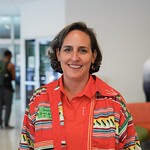 Dr. Christian Furman, AB ’92 is the Director of General Internal Medicine & Palliative Medicine at the University of Louisville.
Dr. Christian Furman, AB ’92 is the Director of General Internal Medicine & Palliative Medicine at the University of Louisville.

Dean Furman, AB ’90 is Partner & Attorney at Furman & Nilsen, PLLC
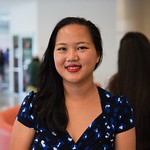 Julie Samuels, BSBA ’12 is the Creative Director at LiuPierre
Julie Samuels, BSBA ’12 is the Creative Director at LiuPierre
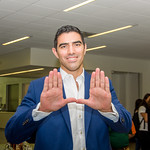 Shane O’Brien, MBA ’05 is the Vice President of Wealth Management at Raymond James
Shane O’Brien, MBA ’05 is the Vice President of Wealth Management at Raymond James
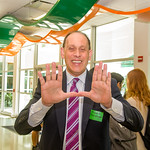 Stuart Rohatiner, JD ’96 is Partner & Director at Gerson Preston Robinson P.A.
Stuart Rohatiner, JD ’96 is Partner & Director at Gerson Preston Robinson P.A.
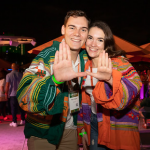 Emmi Velez, BSC ’19 is the Associate Producer at Verizon Media
Emmi Velez, BSC ’19 is the Associate Producer at Verizon Media
Tell us about your experience attending UM?
Christian: Dean and I met at UM – we were both Resident Assistants (RA) in Mahoney, we have a brick in the Love Bridge; so much of our story is connected to the University. I was also on the crew team for a year, but I would say one of my most impactful experiences at UM was being an RA.
Dean: What stands out about my experience at UM was the activities and the academics. One of my strongest experiences was being in student government, I was the senator, speaker, I sold tickets and campaigned. I was also the president of the young democrats. These were my first experiences of real-life politics.
Jules: What stands out about my experience at UM was the lifelong friends and connections I create while here, I even met my husband here.
Shane: I studied at UM for graduate school from 03-05, there is no better place to study international business. What stands out about my experience at UM was the friends, contacts, and teachers I met. The diversity on campus also stands out to me as I met people from around the world.
Stuart: What stands out about my experience at UM was the law professors that challenged me. Also, going to school in the great weather – who couldn’t like going to school in Coral Gables, being near Miami, and the international presence that exists?
Emmi: I loved my experience at UM. What stands out about my experience at UM was being heavily involved in student media and communication.
What does it mean to you to be a ’Cane?
Christian: When I think about being a ’Cane I think about loyalty, lifelong friends, a network. It really is an identity. At the University of Miami is where my philosophy of the world molded.
Dean: When I think about being a ’Cane I think about a larger commitment to education and learning. It’s the place where I learned to be an adult and make long-lasting friends.
Jules: Being a ’Cane means swagger.
Shane: Being a ’Cane means representing the University. Being a ’Cane is made up of the teachers, the other alumni. It means keeping traditions alive and being involved in the community.
Stuart: Being a ’Cane means being an ambassador, a mentor, the responsibility to give back. Being a ’Cane means spirit and athletics. Being a ’Cane is an experience that was so positive to me.
Emmi: Being a ’Cane means being a part of an awesome community that you can reach out to any moment.
If you could give students and alumni one piece of professional advice what would it be?
Christian: My one piece of advice is to be nice and work hard. Hard work always pays off.
Dean: My one piece of advice is to join an organization and be active.
Jules: My one piece of advice is to do what you love. You can be successful no matter where you are, but it is what you love that will make a difference.
Shane: My piece of advice is to challenge and better yourself every day and then apply those skills.
Stuart: My one piece of advice is to always be inquisitive.
Emmi: My one piece of advice is to get an internship as soon as possible; it is never too early and gain experience overall years of college.
Can you tell us about your career path – your experience getting to where you are today?
Christian: I am the division chief of surgery and the skills that got me there I learned in Miami. I didn’t realize then the application and transferability of conflict resolution or communication skills that I learned from being an RA. UM taught me all the skills I use in my life, including caring for a team. My advice for students interested in the field of medicine is to study. Sometimes that means skipping a football game but take advantage of UM’s academics and be involved. Major what you are passionate about – it doesn’t have to be a science, I majored in English Literature. In college, you have the chance to learn about the world that will help you be a better human and doctor, take advantage of your time here.
Dean: My experience at UM helped me get into law school. UM is where I started learning fundamental skills. My advice for students interested in the field of law is to be friendly, build relationships, and meet people. Building interpersonal relationships leads to better outcomes for your clients, which also leads to referrals.
Jules: I graduated at the end of the economic crash. I took my first job but after a few years, I took what I would consider my first career working in marketing for a software company. Since then I went back to additional classes and further my skill set. My advice for students looking to get into the field of marketing is that it is all about who you know. You may question it but it’s about surrounding yourself in those elements – you can volunteer, you can gain experience in so many ways that you don’t think about. I now work for a company that contracts out their work, this allows me the flexibility to have a family.
Shane: I moved to NYC to work at the international trading desk. It was long days but exciting and fun. After eight years there, I moved to Wealth Management for better work-life-balance. My advice for students interested in the field of finance is to be open-minded, work hard, try different areas to find what is rewarding. Also, focus on your listening skills, specifically attributed to your client’s needs, it’s 10% talking and 90% listening.
Stuart: As an accountant that went to law school, I got my first job in tax research as a special assistant to the founders of a company. My confidence in my profession grew in law school. I’d suggest students interested in the fields of finance or law is to get additional education and complete informational interview ahead of the time. Down the line, informational interviews really pay off and open doors up – always remember to send a thank you note after your informational interview.
Emmi: I utilized my resources on campus to help me in my career search. I found out about an event in the School of Communication where I was able to gain an internship that led to a full-time job at Verizon Media.
Why is networking and mentoring important to you as a professional and an alumnus?
Christian: I use networking every day. Networking is important because you can’t do anything on your own, you have to have a team. Mentoring is also important to me in order to pay it forward as I have been mentored.
Dean: Networking is important because it is fun, and it is important to give back. It is nice to learn and meet new people. My business is mainly referrals, the biggest case I had was from a referral in my network.
Jules: The notoriety and network of UM has helped me personally as an alumna. Networking and mentoring helped me create bridges within the network.
Shane: It’s important to me to help the next generation; there is so much potential in future generations. Personally, Dr. Anita Cava, my Business Ethics professor was a mentor by pushing me to pursue happiness [a career that made me happy].
Stuart: Networking is important because you never know who you can meet. Everyone has a story or problem to solve and who knows if you can be a fit. Mentoring is important because of the value of giving back and having the opportunity to impact someone’s life.
Emmi: Networking and mentoring are important because it opens doors for other students at the U. The more connections students can make, the more comfortable and supported they feel within the network.

